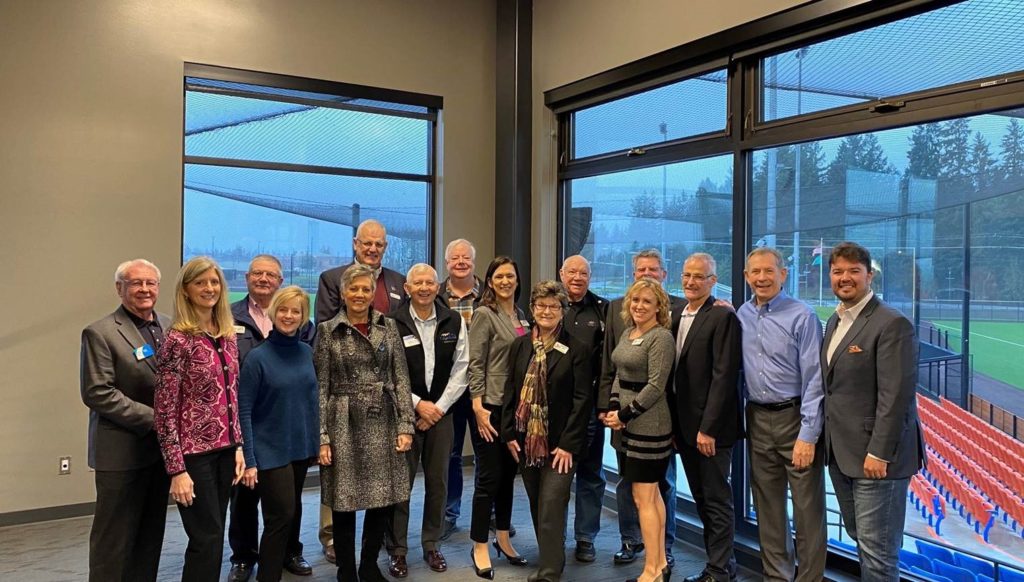Hello, Friends and Neighbors!
This year’s legislative session began at noon yesterday, with the traditional opening ceremonies. My day began much earlier than that; as Republican leader on the Financial Institutions, Economic Development and Trade Committee (FIET) I met spent much of the morning with the committee chair and staff mapping out things we want to accomplish before the first deadline for policy-committee votes, which is less than a month away.
Following the formal start of the 2020 session, in the Senate chamber, I returned to my office in the nearby Newhouse Building for more meetings about a variety of issues that will likely come before us. But on my way back I was reminded about another way people often use to communicate about issues to their lawmakers: rallies outside the Legislative Building. This year the opening-day rallies included a group of farmers who came to raise awareness about the value of agriculture in Washington (it’s the biggest employer!) and another group of citizens concerned that their votes on the recent I-976 ballot measure are being ignored (not by me!).
Today my committees (FIET, Law and Justice, Ways and Means) had their first meetings of this session. Also, I and other senators walked across the Rotunda to the House of Representatives at noon for the governor’s “state of the state” address, which is always delivered to a joint session of the Legislature.

I appreciate touching base with local organizations (like the Port of Ridgefield and City of Ridgefield, here) just before a legislative session — it’s one more opportunity to listen to their priorities and concerns.
I’m told there will be some votes taken by the full Senate before this first week wraps up, but for me the high point will come at 10 o’clock Thursday morning; that’s when the Law and Justice Committee will have a public hearing on Senate Bill 5149, my legislation to enable real-time electronic warnings for domestic-violence victims. It didn’t pass in 2019, but I’ve reintroduced it as the Tiffany Hill Act, in honor of the young Clark County mother who was slain by her estranged husband despite the protection order she had obtained against him. If this type of technology had been available, Tiffany may have had a fighting chance to protect herself – and that’s exactly why SB 5149 needs to become law without any further delay!
Important notice about writing to me
I appreciate it very much when people take the time to write to me. However, you need to know about a very important change concerning emails and letters: Due to a December 2019 ruling by the state Supreme Court, the names and supplied contact information of people who contact my office are now subject to public disclosure. Other information supplied to my office may also be open to public viewing on request, unless specifically exempted under RCW 42.56, which is the state Public Records Act.
I hope you’ll keep the messages coming, because it’s such a great way to learn about problems my constituents are having with government agencies, or questions people have about laws and regulations. Sometimes your emails and letters also inspire legislation. However, you now should be cautious about including certain details – like sensitive information about yourself or a family member – as that information may now be considered “public” once it reaches my mailbox.
While we’re on the subject of messages, let me share from a very thoughtful and detailed letter I received in December from a Clark County resident named Ina. She detailed her concerns about the budget changes proposed by the governor, and other observations about government. It was hard to decide which part to quote, so I’ll combine a couple of the things she wrote:
“I don’t know for sure who makes up the budget but perhaps someone with a limited income
should do it. You should only spend what you have…We do not need a state income tax
or a new transportation tax or any other new taxes or a raise in property tax.”
Ina probably would be glad to know Governor Inslee isn’t asking the Legislature to raise taxes directly in 2020. However, that really isn’t something to celebrate, considering all the new and higher taxes he signed this past year: nearly $26 billion worth over the next 10 years! Also, I emphasize the word “directly” because he wants to change the formulation standard for motor fuel in a way that would cause a significant increase in the price we all pay at the pump. It would be like an increase in the gas tax, but without any of the investments made possible by the gas tax.
A new move in campaign for state income tax
I expect my constituent Ina would be disappointed, as I am, to learn that 15 legislators from the majority side (seven of my Senate colleagues and eight from the House) have taken a new step in a coordinated effort to clear the way for a state income tax. You may remember how Seattle’s city council adopted a local income tax in 2017, only to have it (correctly) declared illegal by a King County judge. The city appealed, and the case is now before our state Supreme Court. The 15 Democrat legislators inserted themselves into the case on Monday by filing a legal brief which asks the justices to overturn the long-standing idea (based on previous court rulings) that a state income tax is unconstitutional.
My colleagues’ action disrespects the voters, who at every opportunity have rejected a state income tax (most recently, in 2010). Also, their legal brief stretches the truth by claiming the state’s tax system is “not transparent because, in large part, there is no personal income tax.” State government does need to be more transparent (which is why I want to prohibit the use of title-only bills), but creating an income tax won’t help with that. Also, they argue that “given the current state of the economy and the failing social safety net, there is a need for local governments and the state to raise additional revenues.” That too is a tough one to believe: Not only is the economy generating plenty of revenue already, but in 2019 these legislators helped increase state spending by $9 billion over the previous budget — so if the social safety net is failing, where did all those billions go?
One last housekeeping item: My office is trying a new system for scheduling appointments, so if you’re thinking of traveling to the Capitol during our session (scheduled for 60 days this year) and would like to meet with me, please send a meeting request by email (to Lynda.Wilson@leg.wa.gov) instead of phoning my office. We want to give this new technology a thorough test, and emails are the best way to do that.
Yours in service,











